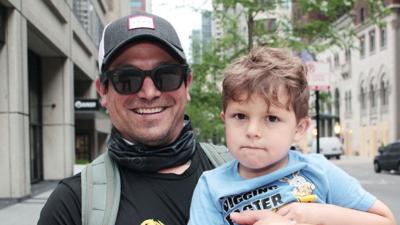Chris Pena, born in Chicago’s Pullman neighborhood, moved to nearby Calumet City when he was six years old. The son of a father who worked for Ford and a mother who was employed by ComEd, he graduated from Marian Catholic High School in 1993 and took a job on the assembly line at Ford’s Chicago Assembly Plant. Like his father, he joined the United Auto Workers union and is serving his third term as the group’s president.
The 2.8-million square foot facility, at 12600 S. Torrance Ave., was built in 1924 to assemble the Model T. Today, it employs nearly 6,000 people and produces about 350,000 Ford Interceptors and Lincoln Aviators every year, many of which are up-fitted into police vehicles using parts supplied by nearby manufacturers.
Besides getting married and having a son five years ago, Pena achieved another of his “life goals” by relocating from the suburbs to Streeterville in 2014.
“I grew up in the outskirts but always wanted to live downtown in the city,” he said. “I couldn’t have picked a better neighborhood.”
His first car was a Ford Escort he bought in high school. He currently drives an Explorer. He’s owned a succession of Fords, including a 1985 Mustang and a 1990 F150 pickup, both of which were modified to be as fast as the machines used to drag race on Doty Road, just down the street from the Ford plant.
What is the function of the United Auto Workers?
We represent about 6,000 assembly line workers and skilled tradespeople like electricians, carpenters, and toolmakers. We negotiate benefits, health care, safety conditions and wages. Last year, all the members approved a four-year contract that was negotiated by our bargaining team.
What are your responsibilities?
We’re bringing in about a hundred new employees a week, and I orient them by explaining how the union works and describing our community outreach. I oversee about fifteen committees that increase awareness and raise money for different causes and charities. I’m also part of the diversity and inclusion program to make sure that we’re hiring veterans and minorities across all age groups, and I work with Ald. Suzanne Garza to hire a certain amount of people from the 10th Ward.
How do you earn and maintain the trust of the people you represent?
I have a great team behind me. All the officials on our board are elected, and a lot of us have worked here for decades. Any job that someone’s doing, I’ve probably done it before. We have an emergency response team that I was a member of for ten years, so a lot of people have seen me performing CPR or tending to injuries in the plant. I guess I gained some trust through that.
How do you determine what’s best for the people you represent?
We hold meetings and conduct surveys to get feedback from our members.
How did the pandemic affect the plant?
A supplier on our campus reported a case in March, so we shut down. We began slowly bringing back crews in mid-May. We’ve also modified the plant and introduced safety procedures like face shields, thermal temperature readers and questionnaires. If someone tests positive, they and everyone in their area are quarantined for 14 days.
Why do we need unions?
Union workers set the bar for the world. Some of the countries where we get a lot of our parts from have little kids working for like $3 a day. Keeping our employees healthy helps keep the entire country healthy, and American products help the economy. I would bet on an American vehicle any day.
How have the recent protests affected Ford?
We have a civil rights training center and committee. If people are feeling passionate about certain issues, we can help them understand their rights within the workplace and the history of civil rights in general.
What's the most rewarding thing about working for Ford Motor?
I’ve always loved cars, and the plant’s history intrigues me. During World War II, we built jeeps and armored personnel carriers and started employing a lot of women, because men were fighting overseas. In the ’70s, we built the Starsky & Hutch Gran Torino. Now we’re doing police cars. A lot of people have seen me become a man at this place, and I know many of the employees, as well as their parents and grandparents. Now, my five-year-old son loves Hot Wheels and always asks what we build.
What current challenges does the U.S. auto industry currently face?
Besides providing affordable vehicles that meet today’s safety and environmental standards, we’re challenged by the tariff war with China. We import about 150 foreign cars for every single American car that we export. We have to do better on that balance.








(0) comments
Welcome to the discussion.
Log In
Keep it Clean. Please avoid obscene, vulgar, lewd, racist or sexually-oriented language.
PLEASE TURN OFF YOUR CAPS LOCK.
Don't Threaten. Threats of harming another person will not be tolerated.
Be Truthful. Don't knowingly lie about anyone or anything.
Be Nice. No racism, sexism or any sort of -ism that is degrading to another person.
Be Proactive. Use the 'Report' link on each comment to let us know of abusive posts.
Share with Us. We'd love to hear eyewitness accounts, the history behind an article.